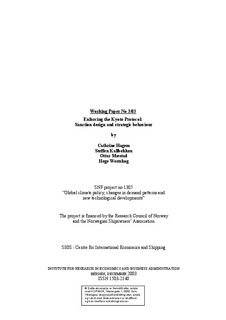| dc.contributor.author | Hagem, Cathrine | |
| dc.contributor.author | Kallbekken, Steffen | |
| dc.contributor.author | Mæstad, Ottar | |
| dc.contributor.author | Westskog, Hege | |
| dc.date.accessioned | 2006-06-26T10:55:36Z | |
| dc.date.available | 2006-06-26T10:55:36Z | |
| dc.date.issued | 2003-12 | |
| dc.identifier.issn | 1503-2140 | |
| dc.identifier.uri | http://hdl.handle.net/11250/166500 | |
| dc.description.abstract | This paper looks at how strategic considerations may play a role in the decision of whether or not to impose sanctions on non-compliant Parties under the Kyoto Protocol. A member of the Enforcement Branch might have an incentive to vote for sanctions towards one non-compliant country and not another even with the same violation. Hence, a certain composition of the members of the Enforcement Branch could decide to sanction one country and not another for the same violation, while another composition might choose differently. The reason for this is that the current sanction mechanism under the Marrakesh Accords affects the economy of the complying countries, including those that are members of the Enforcement Branch. We discuss an alternative design of the enforcement mechanism that may reduce these economic effects of sanctioning for the complying parties. | en |
| dc.format.extent | 246632 bytes | |
| dc.format.mimetype | application/pdf | |
| dc.language.iso | eng | en |
| dc.publisher | SNF | en |
| dc.relation.ispartofseries | Working paper | en |
| dc.relation.ispartofseries | 2003:3 | en |
| dc.title | Enforcing the Kyoto Protocol : sanction design and strategic behaviour | en |
| dc.type | Working paper | en |
